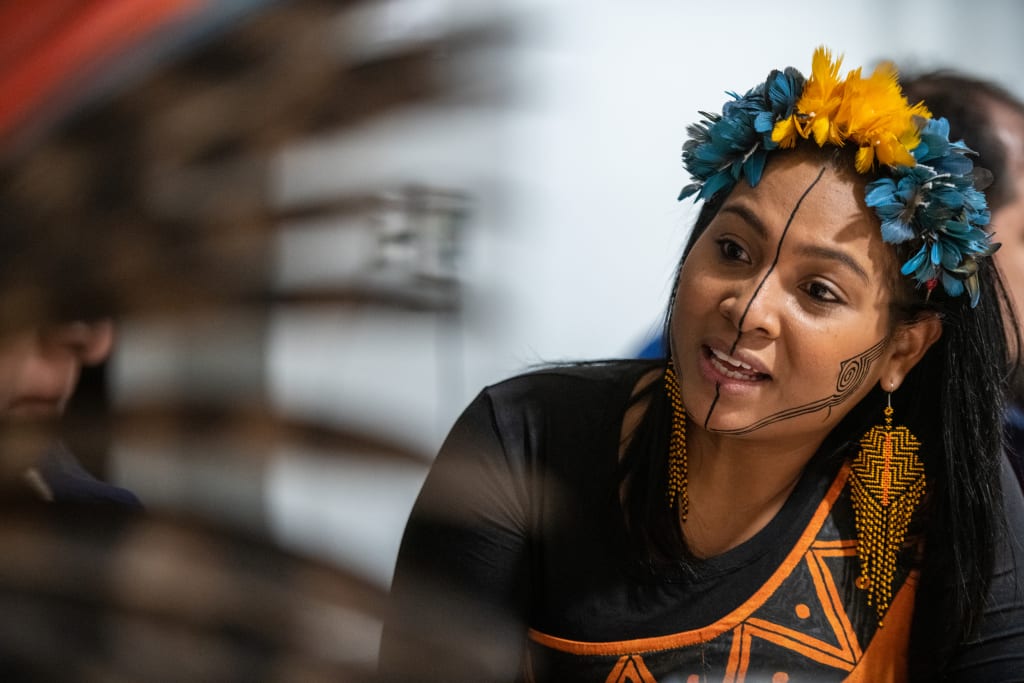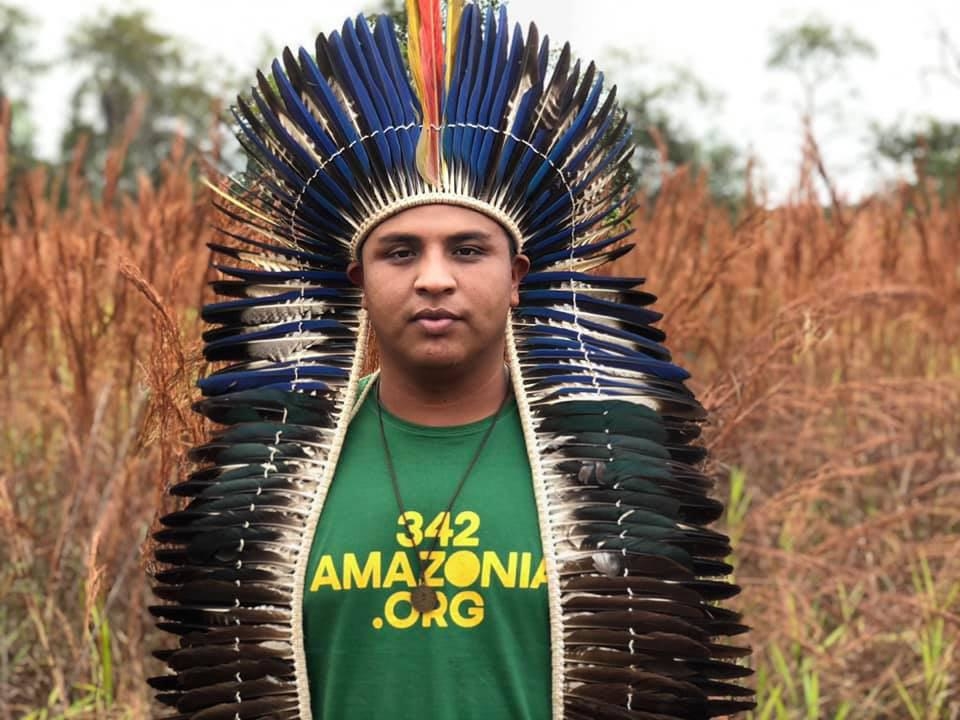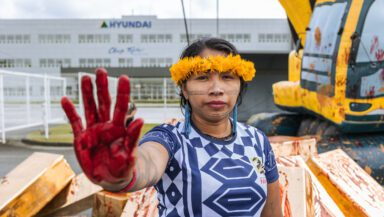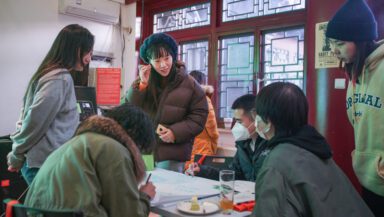A delegation of Indigenous leaders from across Brazil travelled to 12 countries and 15 cities across Europe in 35 days to ask for support in their fight for survival.
They are demanding that European governments, businesses and consumers put Indigenous rights and environmental protections first in negotiations and trade with Brazil.
Through high-level meetings with leading politicians and business representatives, and public actions and protests, they have pushed for the violence and environmental destruction they face to be tackled.
As their journey through Europe came to an end, new data showed the highest rate of Amazon deforestation in over a decade. This is why action is urgently needed.
In many moving speeches while in London, they told various audiences that they are fighting for their very survival as people. They also paid tribute to Amazon forest guardian Paulo Paulino Guajajara, who was shot dead by a logger in the Amazon while they were in Europe.
Here are some of their stories.
Angela Kaxuyana
Angela is from Katxuyana-Tunayana-Oriximiná Indigenous Land, which lies between the states of Pará and Amazonas, in a preserved area of the Amazon rainforest. She spoke at an event at the London School of Economics.

Angela spoke to representatives from major British supermarkets, but the fast food companies did not attend the meeting. © Chris J Ratcliffe / Greenpeace
There have been 135 killings of indigenous leaders and human rights defenders since the start of Bolsonaro’s campaign. It seems like a small number but it’s a lot, especially as the population of Indigenous people in Brazil is one million.
We also must speak about the burning down of forests, and fires on our lands. These are shocking numbers as well. In the space of six months, it’s 14 million hectares of land.
We need to realise that this is the responsibility of every one of us. We need to pressure our governments to protect this land.
It’s scary given all the treaties and agreements being discussed – this is another reason for our journey through Europe. For example the Mercosur, EFTA [European Free Trade Association] and other trade agreements.
You might ask, “What have I got to do with the Mercosur, the EFTA agreements?”
You all have everything to do with these agreements – because if you don’t change your way of life, your mode of consumption, it will have a direct impact on Indigenous lands.
These agreements are made precisely to handle European demand for products. These products – don’t think they don’t come from areas that aren’t Indigenous territories, that aren’t conflict zones, or from areas of slave labour.
It’s necessary to pressure our parliaments and authorities so these international agreements that violate our agreements aren’t ratified by the countries involved. Those countries not directly involved, they should pressure others too.
It’s necessary to recognise our fundamental role in protecting these lands – lands that will not only save our lives, but save humanity too.
In Brazil, one thing they often say is, “Isn’t that a lot of land for very few indigenous people?”. Today, we have 13% of the national territory for one million people. But 1% of the population – that’s agribusiness – has 44% of the land.
We would ask the same question: “Isn’t that a lot of land for agribusiness?” And they are private lands for a few people. Ours are collective lands, to maintain the survival not just of our people, but of biodiversity, and all humanity.
And the lands used for agribusiness are for profit and for greed of non-Indigenous Peoples.
Kretã Kaygang
Kretã is from the Mangueirinha Indigenous land, an area of Atlantic Forest in the countryside of Paraná state, threatened continuously by loggers. In the video below he is speaking outside 10 Downing Street.
Erisvan Guarani Kaiowá
Born in Mato Grosso do Sul, Erisvan represents one of the Brazilian Indigenous Peoples who suffered the most violence as a result of agribusiness – the Guarani Kaiowá. He spoke at an event at the London School of Economics.

Erisvan works to bring the voices of Indigenous Peoples to the world’s media. © Midia Ninja
For more than 519 years, us Indigenous Peoples have been fighting for our rights. It’s a fight to guarantee our survival. I’m speaking about survival, to fight for land, for a live planet.
It’s a fight for the right to life, that was always denied throughout the process of colonisation of Latin America. Many of our peoples were massacred in this unjust and bloody fight. We are the survivors of these Indigenous Peoples who were assassinated, exterminated in the name of development.
We are here, we are angry and we are mourning – for one more warrior who had his life taken. A guardian of the forest who defended our land. And he was killed by the people who act in the name of fascism, by the Bolsonaro government.
Paulo Paulino Guajajara, our brother, was a brave warrior – invisible in the eyes of our society.
It’s difficult for us to be here on the other side of the world, telling you that indigenous lives are being taken in the name of capitalism in Brazil. When they kill a forest guardian, the right to defend the planet also dies with them. A planet, with water, with earth, and with nature for our next generations.
It’s necessary to say to the world: “Enough, enough of indigenous genocide.”
We are here to show to the world, to really show that we will not give up, we will not step back. Land for us is really sacred, and no money can buy it.
Sônia Guajajara
Sônia Guajajara is from the Guajajara/Tenetehar people, indigenous to Maranhão state. She is the executive coordinator of the Brazil’s Indigenous Peoples Coalition (APIB) who organised the European tour. In the video below, she is speaking outside 10 Downing Street.
Célia Xakriabá
Célia Xakriabá, from the Xakriabá people of Minas Gerais state, is a PhD candidate in anthropology. Her focus is to expose the historical absence of Indigenous women in politics and other areas of public life such as universities. She spoke at an event at the London School of Economics.

Célia Xakriabá has been an activist since she was 13 years old. © Raquel Aviani / Secom UnB (CC BY 2.0)
People ask why have we done this crazy journey across 12 countries. It’s because at the moment we are suffering a legislative genocide in Brazil.
In the last university we went to in Switzerland, they said it’s very serious to be calling it a genocide. I said sorry, I was wrong, it’s a legislative genocide. We are suffering a genocide – an ethnocide – that kills our legal identity. It’s an ecocide, sponsored and funded by the Brazilian government.
Since the first country we went to, Italy, we have been speaking about the Mercosur agreement, which is trying to auction the lives of Indigenous People.
They try to justify it by saying there’s a clause in there about Indigenous Peoples. But it’s not true because it doesn’t guarantee us our land rights. I don’t know how it could be possible that they think they are guaranteeing indigenous rights when they are taking our land.
And then they try to justify it by saying, “It’s the only way to have a dialogue with the Bolsonaro government”. But Bolsonaro’s government doesn’t abide by international agreements or treaties.
A government that can’t even uphold the Brazilian constitution – do you believe it will uphold the Mercosur agreement?



